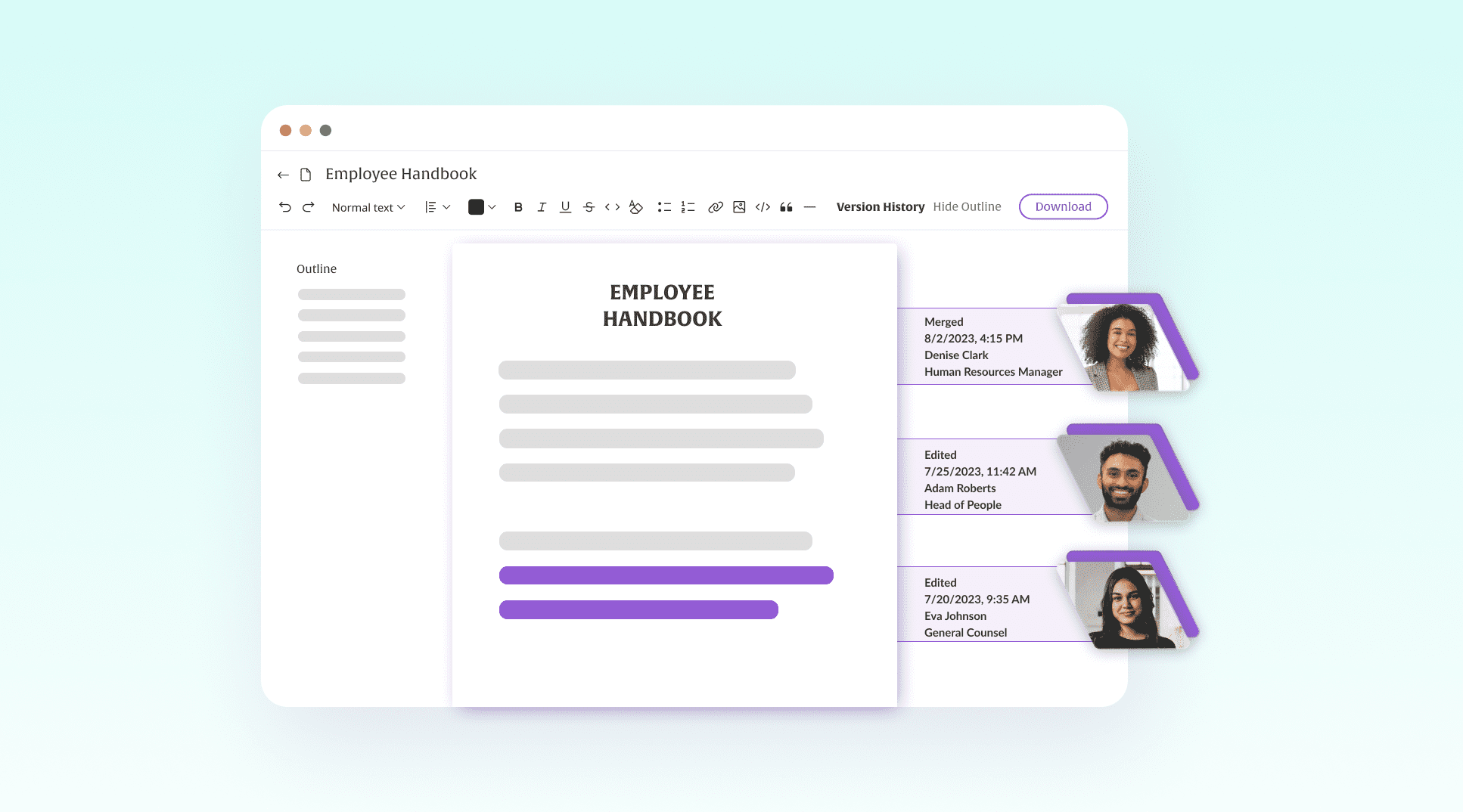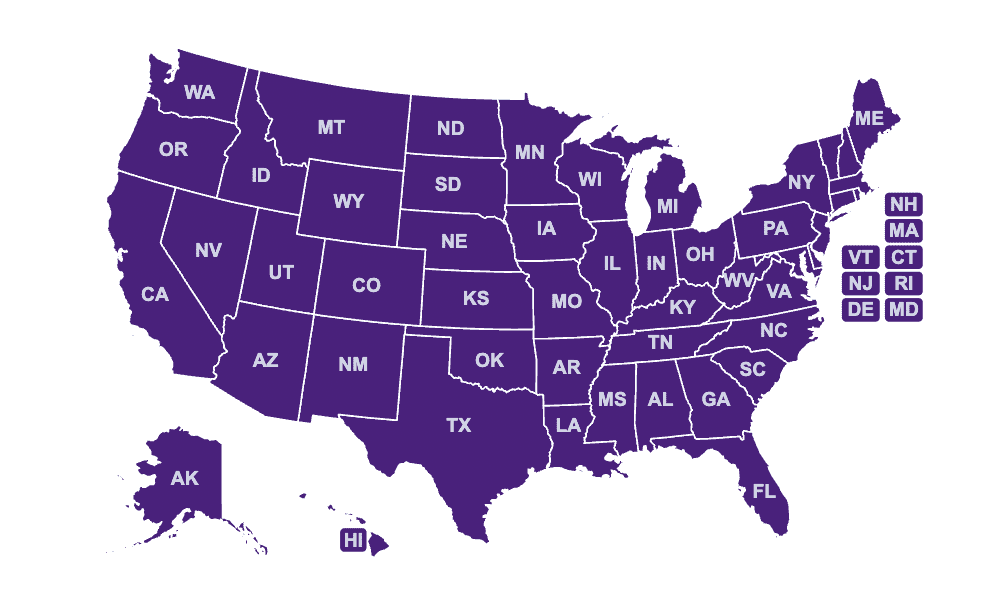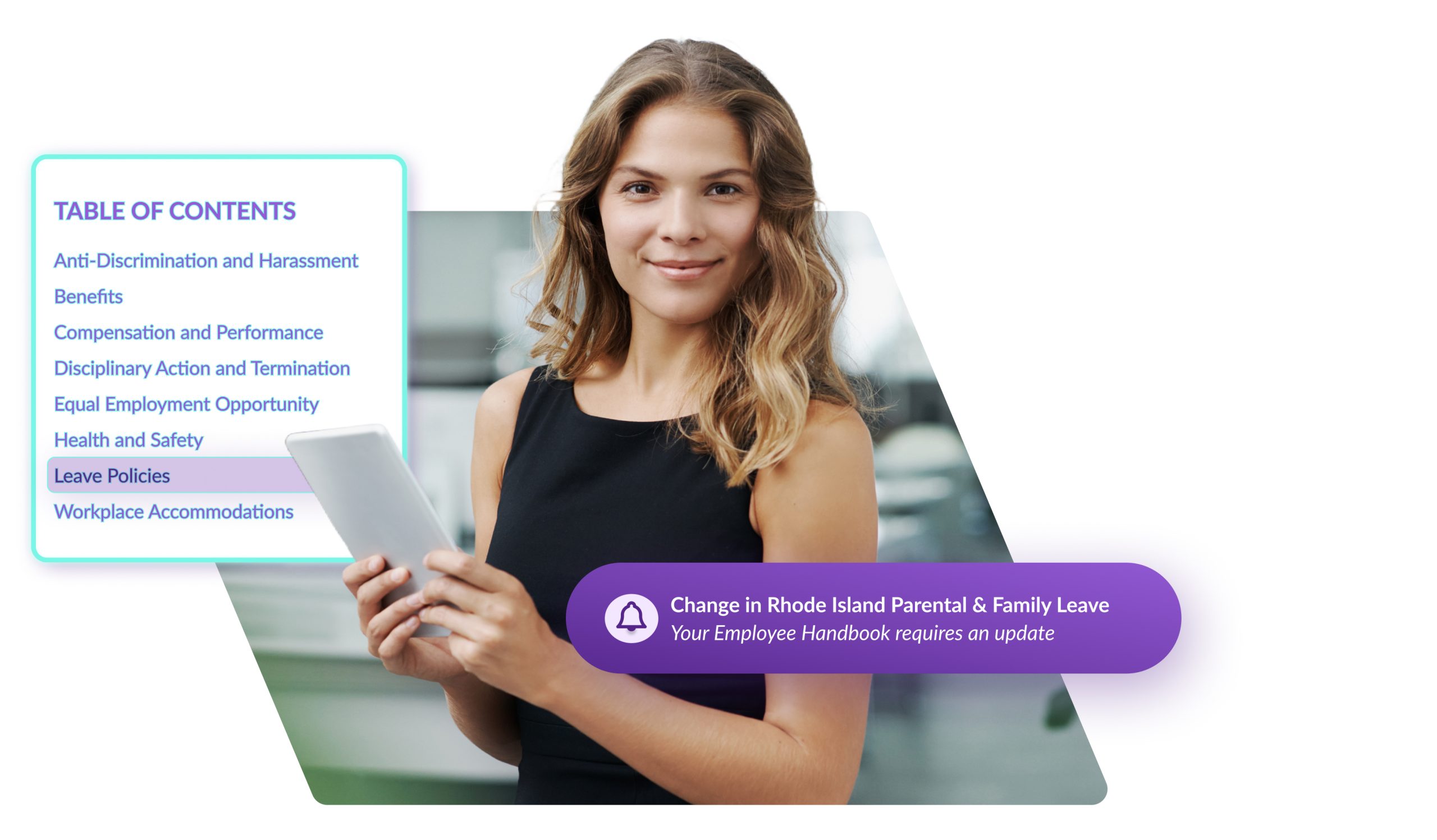Never worry about outdated policies again

Legal expertise, minus the complexity
Your employee handbook is more than a document—it’s your first line of legal defense and a reflection of your company culture. But it only works if it stays up to date. With SixFifty, you get legally sound, easy-to-understand policies without the lawyer-speak.
Compliance at every level
Ensure your handbook meets state, city, and county-specific requirements, so you’re always covered—no matter where your employees work.
One less thing for HR to worry about
Legal fees add up, and manual handbook updates eat into your time. HR wears enough hats—employment lawyer shouldn’t have to be one of them. Automate handbook creation, law monitoring, and updates so you can focus on, well, everything else.
Handbooks, built your way
Your handbook, your rules (well, plus the law). Create and customize policies in the format that fits your business best. Build a multi-state handbook from scratch, generate state addenda to supplement an existing handbook, or select individual policies from our library to meet your specific needs. No matter how you structure it, SixFifty makes it easy to stay compliant and keep your handbook up to date.
Automate a compliant multi-state handbook
Generate state-specific, compliant policies
Answer a few quick questions about your business, and SixFifty will automatically create a handbook tailored to the locations where your employees work.
Distribute & collect signatures
Easily share your handbook online as a public link or through an employee portal where team members can log in, review, and sign—ensuring compliance and accountability.

Frequently asked questions
Which locations does the platform cover?
SixFifty covers all 50 U.S. states, Washington D.C., and major city and county-specific employment laws to ensure your handbook is fully compliant wherever your employees work.
How much does it cost?
Pricing for a SixFifty subscription is based on how many employees you have and how many states they are located in. Learn more here.
What information do I have to provide to generate a compliant handbook?
To generate a compliant handbook, you’ll need to provide some key details about your business, including the type of handbook you want to create (core handbook with addenda, state-specific policies, or universal leave policies), the number of employees and their work locations, and answers to a few follow-up questions to determine the required policies for compliance. You’ll also be asked to provide contact information for handbook-related inquiries and select any optional policies you’d like to include. Once entered, this information is saved to your company profile, making future document creation even faster.
What policies are included?
- Affinity Group Policy
- Americans with Disabilities Act Policy
- Anti-Bribery and Anti-Corruption Policy
- Arbitration Policy
- Artificial Intelligence in the Workplace Policy
- At-Will Employment Policy
- Background Check Policy
- Bereavement Leave Policy
- Business Expense Reimbursement Policy
- Business Travel Policy
- Cal-OSHA COVID-19 Prevention Procedures
- Cal-OSHA Major Outbreak Guidance
- Cal-OSHA Outbreak Guidance
- Cell Phone Policy
- COBRA Policy
- Code of Conduct Policy
- Company Property Policy
- Confidentiality and Trade Secrets Policy
- Conflict of Interest Policy
- COVID-19 Prevention Policy
- Crime Victim Leave Policy
- DEI – Action Plan
- DEI – Assessment
- DEI – Candidate Evaluation Form
- DEI – Exit Interview Form
- DEI – Plan and Vision Statement
- Desk Hoteling Policy
- Direct Deposit Policy
- Domestic Violence Victim Leave Policy
- Dress Code Policy
- Drug and Alcohol Abuse Policy
- EEO and Anti-Discrimination Policy
- Electronic Devices While Driving Policy
- Emergency Services and Civil Service Leave Policy
- Employee Benefits Policy
- Employee Classification Policy
- Employee Dating Policy
- Employee References Policy
- Employee Referral Policy
- Employment of Relatives Policy
- Exit Interviews Policy
- FMLA Policy
- Gifts Policy
- Handbook Acknowledgement
- Health and Safety Policy
- Holidays Policy
- Home Office Reimbursement Policy
- Immigration Law Compliance Policy
- Internal Pay Transparency Policy
- Job Duties Policy
- Jury Duty Leave Policy
- Key or Access Card Policy
- Lactation Accommodation Policy
- Leave of Absence/Sabbatical Policy
- Marijuana Policy
- Meal and Rest Break Policy
- Military Leave Policy
- NY Hero Act Plan
- Off-Duty Use of Facilities Policy
- Organ, Bone Marrow, and Blood Donor Leave Policy
- Outside Employment Policy
- Overtime Policy
- Paid Time Off and Vacation Policy
- Parental Leave Policy
- Payment of Wages Policy
- Payroll Deductions Policy
- Performance Review Policy
- Permanent/Temporary Relocation Policy
- Personnel Files Policy
- Pets in the Workplace Policy
- Progressive Discipline Policy
- Protected Activity Policy
- Public Relations Policy
- Punctuality and Attendance Policy
- Record Retention Policy
- Religious Accommodations Policy
- Remote Working Policy
- Salary Pay Policy
- San Francisco Public Health Emergency Leave Policy
- School Leave Policy
- Sexual Harassment Policy
- Sick Leave Policy
- Smoking Policy
- Social Media Policy
- Social Security Policy
- Solicitation and Distribution of Literature Policy
- Technology Systems Policy
- Termination of Employment Policy
- Timekeeping Policy
- Video Conferencing Policy
- Voting and Election Official Leave Policy
- Weapons in the Workplace Policy
- Whistleblower Protection Policy
- Witness Duty Leave Policy
- Workers’ Compensation Policy
- Workplace Violence Policy
- Workplace Visitor Policy
- Workweek and Work Schedules
Can I add my own policies?
Yes! SixFifty generates handbooks with all the required policies for compliance based on where your employees are located. You can also choose from 100+ optional policies in our Policy Library to build a comprehensive handbook. Once generated, you have full control to add custom policies, edit content, and adjust formatting to make it your own.
What is included in a SixFifty subscription?
A SixFifty subscription includes three core modules: Hiring, Employee Handbook, and Separation. It also comes with essential features like Research, a comprehensive employment law database, AI-powered employment law search, and automated legal updates to keep your documents compliant.
Loved by companies of all sizes
State-specific handbooks
We track and update employment policies in all 50 states. Check out some of our blogs on employee handbook requirements by state.
Ready to get started?
Build and maintain your legally compliant employee handbook with SixFifty.









